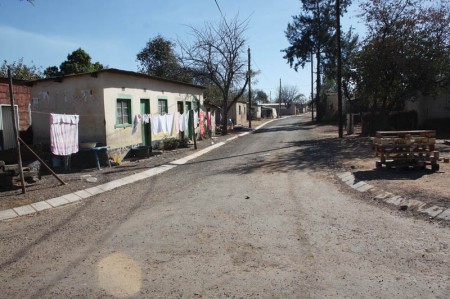Inside Old Naledi�s malnutrition epidemic
Tsaone Basimanebotlhe | Friday January 15, 2016 15:30


Earlier this week, a full Gaborone City Council session was stunned to hear that of the city’s 15 clinics, Old Naledi Clinic consistently had malnutrition cases above the three percent target set by the Ministry of Health. The percentage refers to the number of cases uncovered among patients reporting to clinics.
According to a report tabled by the Urban Development Committee, Old Naledi Clinic reported malnutrition rates of between 11.3 and 4.8 percent between January and February 2015. Within that period, the clinic only once met the target, recording 2.9 percent in June.
Walking around the historically impoverished, high-density area, it becomes increasingly apparent that indeed malnutrition could be an issue.
Experts, including those in the Urban Development Committee say the malnutrition is caused by drunkenness among parents and guardians, high teenage pregnancies, unemployment and generally low incomes.
For GCC principal economist, Tebogo Tshoswane, the rising malnutrition cases are largely a result of negligence. Tshoswane presented the initial shocking report to council earlier this week.
“Our survey has shown that child negligence has contributed badly in these cases,” Tshoswane says.
“The problem is that some parents neglect their children because of drunkenness, while others do not have food to provide for kids.
“Gaborone is generally doing well in the other 14 clinics and we are engaging stakeholders to try to resolve or address the Old Naledi situation.”
In Old Naledi, a senior health official explains that of the various factors, she is most well acquainted with teenage pregnancy. The woman speaks on condition of anonymity as official comments are the preserve of the local authority.
“Our main challenge here is that teenagers fall pregnant while they are not yet ready to take care of children,” she says.
“You can imagine a 21-year-old raising three to four children alone.
“The painful part is that they are not working and many have been abandoned by the father(s) of those children.”
The health official argues if someone is not ready to be a mother, they will have challenges providing their children with adequate nutrition as this also requires guidelines and knowledge.
“Some of these teenage mothers are staying alone because their parents died, again putting a child’s nutrition at risk. Each case differs about these teenagers,” she says.
For the health official, teenage mothers in the area desperately need counselling on caring for their children and even require monitoring from parents.
“It is important that when a ward or constituency has an increase in a certain vice, then the government should step in and help.
“These cases would not be this high if serious action had been taken earlier and a survey done to address the problem.”
Old Naledi councillor, Mathata Mosekwa, has a different take on the matter. He believes the cases of malnutrition are caused by the lack of food rations at the Old Naledi clinic.
“I have given myself time to go to Old Naledi Clinic and I found that food such as dinawa, cooking oil, Malutu and Tsa Bana have not been supplied for a while because of lack of transport.
“I believe council management should also up its game especially in our clinic.
“Again there should be regular check ups in those families that have cases of malnutrition to see if those children feed well or not,” Mosekwa says.
The councillor agrees that high alcohol intake is also resulting in some parents and guardians neglecting their responsibilities.
“This is a worrying issue. Some mothers do not have time to cook for their children because they spend most of the time at the bars or drinking alcohol.”
Men are not free of blame either, Mosekwa says. Some of them, he says, abandon their children. In fact, the councillor believes many malnutrition cases could be avoided if men played their part, both through support and guidance.
“Go bua nnete, ngwana o tshwanetse go pataganelwa ke batsadi ba gagwe botlhe. Ba bangwe bomme gaba bereke ka jalo ga bana madi go rekela bana.” (To tell the truth both upbringing of a child is the responsibility of both parents. Some of the mothers are not working and as such do not have money to buy food for the children).
Ultimately however, no one can deny that the root of the malnutrition challenge in Old Naledi begins with low incomes. The area has one of Gaborone’s highest rates of youth unemployment and poverty.
“You see these two factors contribute immensely on the issue of malnutrition. There is no way people who are unemployed can buy food and of course most of the youth have children.”
For the meantime, it appears the children of Old Naledi will bear the brunt of their area’s history of lack.
